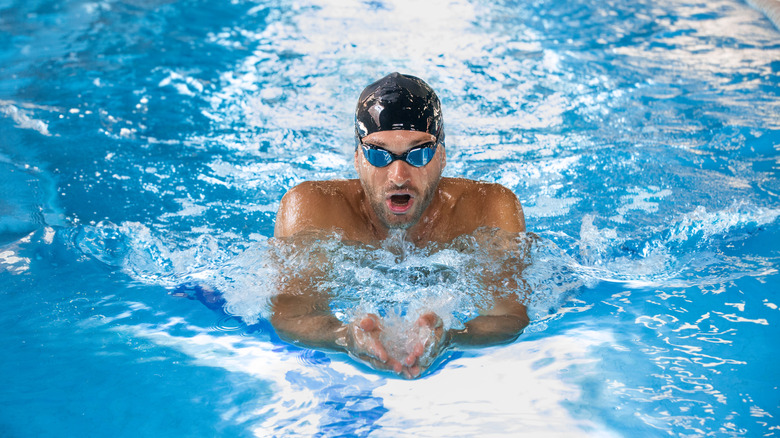The Best Foods To Eat Before You Swim
We've all heard the old adage about not swimming for at least 30 minutes after eating. While that has been disproven, there is a reason behind this advice. Here's what you can eat before a swim and what you should avoid.
The main reason that some people think you shouldn't eat right before you swim revolves around digestion. Some foods are thought to cause cramping that may create an uncomfortable or dangerous situation in the water. However, this myth has been debunked (via Mayo Clinic).
That being said, some foods will make your swim more productive than others, especially if you're swimming as part of your workout. Healthy carbohydrates like whole grains, fruits, and vegetables will give you sustained energy while you swim (via Spoon University). This includes pasta, bagels, bananas, and granola bars. Foods that are high in fat can be difficult to digest and may cause discomfort while in the water. This includes hamburgers, pizza, and other junk food items.
Refueling after a swim is just as important
Swimming provides a great workout and often burns many calories. According to BBC Good Food, it is best to eat within one hour of swimming in order to maximize your recovery. You should eat a combination of carbohydrates and protein. Carbohydrates will replace the lost glycogen in your muscles and liver after exercise and protein will help rebuild the muscle tissue that was broken down. Even if you're just swimming for fun, it's a good idea to refuel with a healthy snack to avoid overeating later.
Some ideal snacks to eat after swimming include yogurt and fruit, chicken wraps, granola and dried fruit, and fish and rice. For a quick and easy option, you can grab a protein shake and a granola bar. Any combination of lean protein and complex carbohydrates is a great option.
Swimming is a great low-impact exercise that can burn calories and build muscle. Knowing how to properly fuel before and after swimming will help you stay energized in the water and maximize the health benefits afterward.


